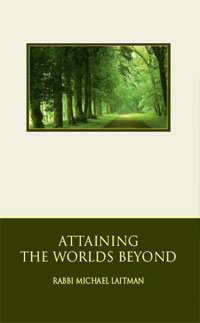Perception of Life Is Contingent upon Pleasure
Life is considered to be a state in which we perceive desires for attaining pleasure, either from receiving or from giving. If the desire to attain pleasure disappears, then the new state is that of unconsciousness, fainting, or death. If we are in such a state that we clearly see and feel that we cannot receive any more pleasure, for example because of the shame that we feel for past actions.
If we suffer so much that even the smallest pleasure we get out of life is neutralized, then we will no longer feel like living. Thus, by means of the surrounding environment, enemies, bankruptcy, or failure in one’s work, those who are ascending spiritually may experience sensations of hopelessness, despair, and a complete lack of meaning of existence.
Altruistic Acts and the Fear of Self-Reception
Therefore, we must put all our efforts into receiving pleasure from performing deeds that are considered good in the eyes of the Creator, and in this manner bring happiness to Him. Such thoughts and actions contain such tremendous pleasure, they can neutralize the greatest suffering in this world.
We may already be at the stage of being able to perform altruistic acts. Whatever action we may be engaged in, we will not be calculating personal gain, and will think only of the well-being of the One for whom the act is done (i.e., for the Creator).
However, if at the same time we do not receive pleasure from our altruistic actions, then such actions will be considered as pure giving. For instance, observing the commandments only for the sake of the Creator will not accord us the Light of the Creator (the pleasure) that corresponds to each commandment. This is because the process of self-improvement is not yet complete.
Having received the pleasure from the unobstructed Light of the Creator, one would be at risk of awakening one’s egoism and, then, having that egoism demand to receive pleasure at any expense for reasons of self-gratification. at that point, the person would not be able to resist this pleasure, and would obtain it not for the reason of pleasing the Creator, but from the sheer force of the desire to attain pleasure.
Giving to the Creator Is the Ultimate Pleasure
Kelim, with which we perform altruistic acts, are known as “vessels of bestowal.” A spiritual object has a structure similar to that of the physical body, and consists of 613 organs.
In general, the design of the spiritual forces is similar to the physical structure of our bodies.
For this reason, 248 vessels of bestowal are located above the upper torso of the spiritual object and correspond to positive spiritual acts, which each person is obligated to perform.
The Light that is received by one who observes the above spiritual acts is known as the “Light of Grace” (Ohr Hassadim), or “concealed grace” (Hassadim Mehusim). The Light of Wisdom (Ohr Hochma) is concealed from the recipient.
One with strong will power will rectify one’s feelings to such an extent, that this individual will be able to perform altruistic acts as well as receive pleasure from them for the sake of the Creator, that is, to receive pleasure into the past egoistic desires. This process is known as “Receiving for the sake of Giving.”
Consequently, that person will be able to receive the Light that is contained in every spiritual act.(The commandments of the Bible are spiritual acts. Because every person in our world is obligated to fulfill these commandments regardless of their spiritual level these are a necessary preliminary stage in accordance with their primary spiritual goal: to bring pleasure to the Creator).
 “An Unlimited Form of Pleasure Awaits You” is based on the book, Attaining the Worlds Beyond by Dr. Michael Laitman.
“An Unlimited Form of Pleasure Awaits You” is based on the book, Attaining the Worlds Beyond by Dr. Michael Laitman.

